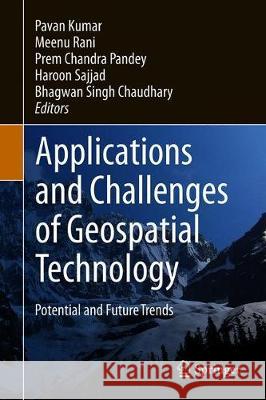Applications and Challenges of Geospatial Technology: Potential and Future Trends » książka



Applications and Challenges of Geospatial Technology: Potential and Future Trends
ISBN-13: 9783319998817 / Angielski / Twarda / 2018 / 277 str.
Applications and Challenges of Geospatial Technology: Potential and Future Trends
ISBN-13: 9783319998817 / Angielski / Twarda / 2018 / 277 str.
(netto: 383,36 VAT: 5%)
Najniższa cena z 30 dni: 385,52
ok. 16-18 dni roboczych.
Darmowa dostawa!
The book encompasses several scopes of interests on sustainable technologies in areas such as water resources, forestry, remote sensing, meteorology, atmospheric and oceanic modeling, environmental engineering and management, civil engineering, air and environmental pollution, water quality problems, etc.
Section I.- General.- Chapter 1 Introduction to Space Technology: Challenges, Potential and Future Trends.- Section II Challenges in Geospatial Technology for Water Resources Management.- Chapter 2 Natural Resource Assessment in Flood Prone Areas of Lower Rapti River Valley: An Application of Geoinformatics.- Chapter 3 Probabilistic Landslide Hazard Vulnerability assessment using weight-of-evidence model along the Koti -Syansu highway corridor, Tehri Garhwal (India).- Chapter 4 Monitoring of Seasonally Variability and Movement of Suspended Sediment Concentration along Thiruvananthapuram Coast using OLI Sensor.- Chapter 5 Remote Sensing based Hazard Assessment of Glacial lakes in Changme Khangpu Valley, Sikkim Himalaya.- Section III Geotechnical Engineering & Applied Earth Sciences.- Chapter 6 Estimation of Urban Population Dynamics using DMSP-OLS Night-time Lights Time Series Sensors Data.- Chapter 7 Modelling the Luminous Intensity of Beijing, China using DMSP-OLS Night-Time Lights Time Series Sensors Data.- Chapter 8 Drought Hazard Analysis over India Applying Multivariate Technique for Composite Indicators.- Chapter 9 The Built Surroundings Induced Urban Heat Island Consequence in speedily Urbanizing Sub-Humid Region using Geospatial Approach.- Section IV Space Technology Potential and Grand Challenges.- Chapter 10 Modeling the Electric Demand using of Spatiotemporal DMSP-OLS and Socio-economic Data for the Sustainable Management and Planning in India.- Section V Space Science in the Twenty-First Century.
Er. Pavan Kumar is a doctoral candidate at Department of Geography, Jamia Millia Islamia, New Delhi, India. He is working on the topic “Carbon stock estimation using Geospatial Approach in Sariska Tiger Reserve (Rajasthan)”. He did B.Sc. (Botany) and M.Sc. (Environmental Science) from Banaras Hindu University, Varanasi, India and subsequently obtained Master’s degree in Remote Sensing (M.Tech) from Birla Institute of Technology, Mesra Ranchi, India. His current research interests include Forest Resource Management, Crop Forecasting, Climate Change and coastal studies. He is recipient of Innovation China National academy award for Remote Sensing. Er. Kumar has published fifty research papers in National journals and authored a number of books.He has visited countries like USA, France, the Netherlands, Italy, China, Indonesia, Brazil and Malaysia for various academic/scientific assignments, workshop and conferences. Er. Kumar is member of International Associations for Vegetation Science, USA and Institution of Geospatial and Remote Sensing, Malaysia.
Mrs Meenu Rani received her M. Tech degree in Remote Sensing from Birla Institute of Technology, Ranchi, India. She is currently affiliated to Department of Geography, Kumaun University, Nainital. She worked on remote sensing applications as a Junior Research Fellow in HARSAC, Research Associate in Indian Council of Agricultural Research and GB Pant National Institute of Himalayan Environment and Sustainable Development. Mrs Rani has authored and co-authored several peer-reviewed scientific research papers and presented works at many national and international conferencesincluding USA, Italy and China. She has been awarded with various fellowships from the International Association for Ecology, Future Earth Coast and SCAR Scientific Research Programme. She specializes in Hydrology, Geomorphology and Oceanography.Her current research interests include watershed modelingand land use planning.She awarded early career scientists achievement in 2017 at Columbia University, NewYork, USA.
This book advances the scientific understanding and application of space-based technologies to address a variety of areas related to sustainable development; including environmental systems analysis, environmental management, clean processes, green chemistry, and green engineering. Geo-spatial techniques have gained considerable interest in recent decades among the earth and environmental science communities for solving and understanding various complex problems and approaches towards sustainable technologies. The book encompasses several scopes of interests on sustainable technologies in areas such as water resources, forestry, remote sensing, meteorology, atmospheric and oceanic modeling, environmental engineering and management, civil engineering, air and environmental pollution, water quality problems, etc. The book will appeal to people with an interest in geo-spatial techniques, sustainable development and other diverse backgrounds within earth and environmental sciences field.
1997-2026 DolnySlask.com Agencja Internetowa
KrainaKsiazek.PL - Księgarnia Internetowa









